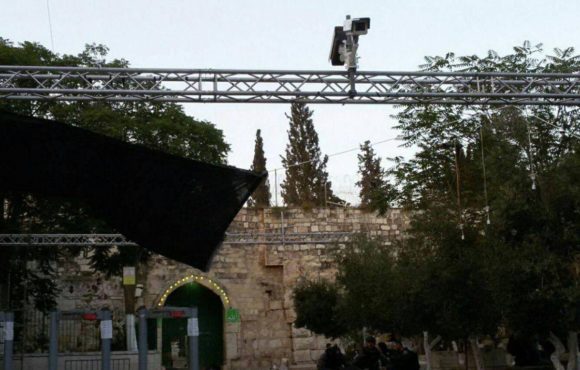Israeli authorities on Sunday installed extra security cameras around the entrances of the al-Aqsa mosque compound, Member of the Israeli Knesset’s Arab Joint List, Aida Touma-Suleiman, confirmed to Mondoweiss. The newly installed security cameras were added amid growing unrest and daily clashes over security measures instituted ten days ago following a deadly attack near the site.
On Sunday night Israel’s security cabinet held a meeting where the possibility of replacing metal detectors at the site with “sophisticated cameras combined with facial recognition software” was discussed according to a senior Israeli official “with knowledge of the content of the meeting,” Haaretz reported.
On Monday Palestinian religious and civic leaders met to discuss the ongoing upheaval and the possibility of such new cameras, according to Palestinian state media agency Wafa. During the meeting the leaders rejected the idea of replacing metal detectors at the entrance of the mosque compound with “new X-Ray vision video cameras that can see through clothing.”
Touma-Suleiman could not confirm whether the new cameras added on Monday were “X-ray vision video cameras,” and Israeli police spokesperson Micky Rosenfeld could not be reached for comment to confirm or deny the possibility.
In a press release following the meeting of Palestinian leaders, a spokesperson said it was decided that “any act that will affect freedom of worship and Muslim rule over Al-Aqsa mosque will not be accepted.”
New security cameras, fences installed over night at Al-aqsa compound, meanwhile metal detectors will not be removed until cabinet meeting. pic.twitter.com/PQso34EsH1
— Alaa Daraghme (@AlaaDaraghme) July 23, 2017
According to the Wafa statement, reinstating the status quo with no new Israeli security measures is the only way leaders will support relative normality to be restored.
“In light of the obstinacy of the occupation authority and its determination to escalate the situation by proceeding with its arbitrary measures against Al-Aqsa mosque and the residents of Jerusalem, the local leaders are determined to continue with their opposition to these arbitrary procedures as well as rejecting any attempt by the occupation to impose its rule over Al-Aqsa mosque,” the statement said.
On July 14, three Palestinian gunmen were shot dead after shooting and killing two Israeli police officers around the mosque compound. Following the incident, Israeli authorities closed the al-Aqsa mosque and surrounding compound for the first time since 1967. The incident happened hours after Israeli forces shot and killed 18-year-old Baraa Hamamda in Dheisha refugee camp during clashes that erupted while Israeli forces were raiding the camp.
The mosque compound was reopened the following Sunday, after Israeli forces installed metal detectors, turnstiles, security cameras and metal barricades at the entrances to the compound.
Palestinians immediately began protesting the new security measures, rejecting the idea of an increase in Israeli control over the site and boycotting the measures by praying in the streets instead of going through the new security to enter the mosque. Protests have erupted across the occupied West Bank, including East Jerusalem, as well in the Gaza Strip and isolated areas of Israel.
Protesters in the occupied West Bank and Gaza have been praying in the streets in solidarity with Jerusalem, and Christian leaders have called for churches to be closed and for Christian worshippers to join the protests for al-Aqsa.
So far three Palestinian protesters have been shot dead over the past week of ongoing demonstrations. Clashes intensified last Friday as a “Day of Rage” against the security measures was announced. On Friday evening a Palestinian broke into a family home in the illegal Israeli settlement of Halamish, stabbing and killing three Israeli settlers aged 70, 46 and 36, and injuring two others. The Palestinian attacker was shot, injured, and arrested.
The ongoing protests and increase in violence have become an international concern as players within the UN, Europe Union, Arab States, the US and more have made statements and offered a hand in quelling unrest.
The Middle East Quartet on Saturday released a statement on the upheaval, calling for a de-escalation of violence.
“The envoys of the Middle East Quartet from the Russian Federation, the United States, the European Union and the United Nations are deeply concerned by the escalating tensions and violent clashes taking place in and around the Old City of Jerusalem,” the statement said, condemning violence on both sides.
“The envoys welcome the assurances by the Prime Minister of Israel that the status quo at the holy sites in Jerusalem will be upheld and respected,” the statement continued.
Palestinian President Mahmoud Abbas on Friday said that all communications between the Palestinian Authority and Israel would cease until Israeli authorities removed the new security measures, however critics have expressed doubt that the Fatah leader will follow through with his statement.



Abbas; he’s a bad joke